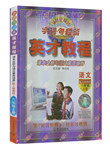题目内容
All these books will ________ to the children who live in the small village.
[ ]
提示:

 字词句段篇系列答案
字词句段篇系列答案“If you want to see a thing well, reach out and touch it!”
That may seem a strange thing to say. But touching things can help you to see them better.
Your eyes can tell you that a glass ball is round. But by holding it in your hands, you can feel how smooth and cool the ball is. You can feel how heavy the glass is. When you feel all these about the ball, you really see it. With your skin, you can feel better. For example, your fingers can tell the difference between two coins in your pocket. You can feel a little drop of water on the back of your hand, too. You can even feel sounds against your skin. Have you ever wanted to know why some people like very loud music? They must like to feel the sounds of music.
All children soon learn what “Don’t touch!” means. They hear it often. Yet most of us keep on touching things as we grow up. In shops, we touch things we might buy: food, clothes. To see something well, we have to touch it. The bottoms of our feet can feel things, too. You know this when you walk on warm sand, cool grass or a hard floor. All feel different under your feet.
There are ways of learning to see well by feeling. One way is to close your eyes and try to feel everything that is touching your skin. Feel the shoes on your feet, the clothes on your body, the air on your skin. At first, it is not easy to feel these things. You are too used to them!
Most museums are just for looking. But today some museums have some things to touch. Their signs say, “Do touch!” There you can feel everything on show.
If you want to see better, reach out and touch. Then you will really see!
1.By touching things .
|
A.you will have a strange feeling |
|
B.you will learn how to reach out your hand |
|
C.you can learn more about them |
|
D.you can tell what colors they really are |
2.Which of the following can be the best title of the story?
|
A.Touching by Feeling |
B.To See or to Feel |
|
C.To See Better—Feel |
D.Ways of Feeling |
3.Which of the following parts can tell you the difference between two coins in your pocket?
|
A.Your fingers. |
B.Your eyes. |
C.Your skin. |
D.Your back. |
4.Which of the following is NOT true?
|
A.Touching is helping us to see better. |
|
B.Our skin may help us enjoy music. |
|
C.People don’t have to learn to feel. |
|
D.Visitors can’t feel the things on show in any museums. |